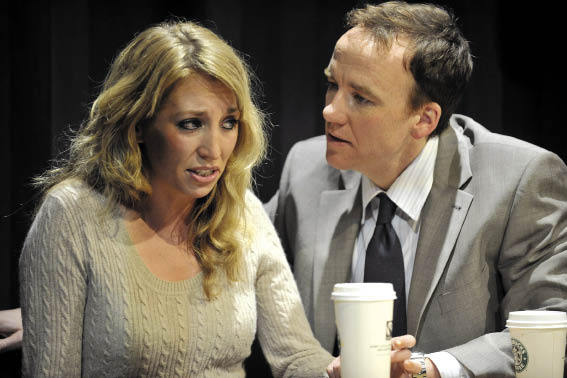The Almeida relishes its specialist status. The boss, Michael Attenborough, isn’t keen on celebrity casting because he wants ‘the theatre to be the star’. It’s a niche operation for purists and connoisseurs, for seekers and searchers, and for those who can spell Verfremdungseffekt without having to check (as I just had to) what the penultimate letter is. We’re privileged to have a theatre in London that wants to raise the bar rather than the bar prices.
The Almeida relishes its specialist status. The boss, Michael Attenborough, isn’t keen on celebrity casting because he wants ‘the theatre to be the star’. It’s a niche operation for purists and connoisseurs, for seekers and searchers, and for those who can spell Verfremdungseffekt without having to check (as I just had to) what the penultimate letter is. We’re privileged to have a theatre in London that wants to raise the bar rather than the bar prices. Just occasionally the Almeida startles us all by flouting its self-imposed asceticism and laying on a straight-up-and-down smash-hit comedy, as if to remind us that it could deliver smart, funny populist shows every night of the week if it wanted to, but it knows we’re better than that.
Becky Shaw, by Gina Gionfriddo, takes a peek into the troubled heart of middle-class America. The play is messy throughout, deliberately and artfully messy, and it opens with a family coming together to dispose of the deceased father’s assets. There are rumours that the old man was gay. A close Japanese pal is said to be in floods of tears. The widow Susan, struggling with MS, is conducting a desperate last-fling affair with a mail fraudster ten years her junior.
Her daughter Suzanna — and the mother and daughter’s names are messily close to each other but not quite exact copies — is emotionally involved with her adoptive brother, Max. Early on, they stumble into bed together and their affair casts a long, and very messy, shadow across the rest of the action. When Suzanna (played with seething, lustful anger by Anna Madeley) disentangles herself from the misanthropic Max she heads in the opposite direction and marries Andrew, a milksop liberal who claims, ‘I weep when I see pornography.’
Andrew is a rescuer of souls. He sets about mending Max’s womanising ways by matching him up with Becky, an unstable thirty-something secretary, whose body-clock is thudding like the approach of a charging rhinoceros. Max and Becky handle each other with fabulous ineptness. On their first date they get mugged at gunpoint. They sleep together once and immediately split up. This plunges Becky into despair. But Max couldn’t care less. ‘Next time you attempt suicide, try harder,’ he says when she half-heartedly cuts her wrist with a blunt lobster knife.
David Wilson Barnes (Max) may have the most unatmospheric name you’ve ever read but his presence on stage has everything his label lacks: flavour, bite, panache, and a depth of colouring and an embittered silkiness that conjure strange hints of Kevin Spacey. I loved Daisy Haggard’s pop-eyed Becky, her skirts too short, her eyes glimmering too nervously and her laughter always on the brink of tears. Haydn Gwynne takes quite a risk playing a disabled pensioner but she brings a steely poise, and plenty of mirth, to the role of Suzanna’s difficult mother.
The play is about learning and about the unreliability of first impressions. Susan begins as a grasping misery guts and evolves into a wise and pragmatic healer. In the course of the play Andrew, discovers that he’s attracted to broken women only, and only for as long as they remain broken. A suicide attempt sounds to him ‘like a mating call’. When it finally strikes Susan that her husband’s love life is a constant hunt for flawed females, the realisation is as moving as it’s hilarious. ‘Your anorexic girlfriend gained 13 pounds,’ she says, horrified, ‘so you married me.’
If Bruce Norris’s satire Clybourne Park is on your must-see list (and it deserves to be) then take in this play, too, because it performs the same risky pirouette across the minefield of the American psyche. It’s not quite as explosive but, beneath the messiness, it’s a more coherent work of art.
There’s more Americana at the Arts Theatre. David M. Lutken’s tribute to Woody Guthrie is an exquisite medley of songs performed by four fabulous musicians. Many of Guthrie’s tunes will be familiar even to people who couldn’t name their composer. (Say ‘This Land Is Your Land’ to yourself and the melody will come.)
Guthrie was Brecht with a banjo and for him communism was a necessity rather than an accessory. The audience had it the other way around and they joined in the choruses like holiday-makers taking a vacation from political reality. It’s a great night out for certain right-on Brits. You sit there in your comfy West End seat, which you can afford even in the middle of a recession, and you cheer communist slogans and go ‘yeee-harr, man!’ at lyrics extolling the temptations of shared ownership. Then you go home and find your house occupied by Bulgarian squatters. And you call the police. That’s communism. A great musical but as a straight play it’s always a tragedy.
hugo glendinning






Comments